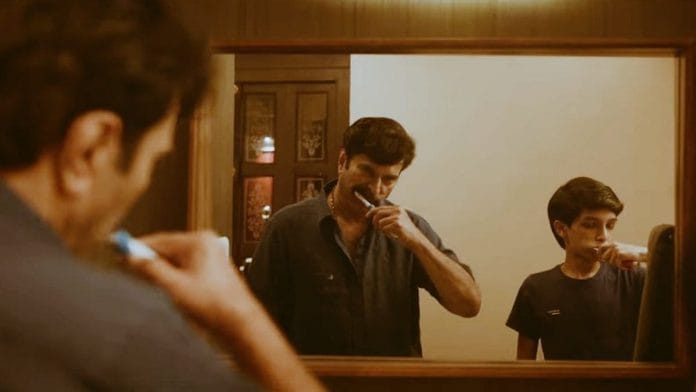In his bid to hunt, King Parikshit wreaks havoc on a forest. Exhausted after his killing spree, Parikshit now wants to quench his thirst. The tired King chances upon a sage immersed so deep in meditation that he can’t hear the King’s repeated requests for water. A furious Parikshit places a dead snake around the hermit’s neck and, as expected, attracts a deadly curse—the King is to die of a snake bite in seven days.
Parikshit loses his mind. He locks himself in a tower and surrounds himself with guards. In his paranoia, he kills and maims every snake in his vicinity. But a hermit’s curse seldom fails. On the seventh day, the paranoid King is killed by snake god Takshak, masquerading as a Puzhu (worm) in a basket of fruit.
Little does the viewer realise that this over-the-top enactment of the legend of Parikshit is more than a gripping opening scene in Ratheena PT’s debut film, Puzhu, now streaming on SonyLiv. It is one of many powerful attempts at foreshadowing in the Malayalam movie by writers Harshad, Sharfu and Suhas. They weave theatre and mythology to set an arc for a grim tale yet to unfold. And then there’s Mammootty.
Also read: Jayeshbhai Jordaar’s non-macho hero works well. But it’s an old message in new bottle
Compelling plot, score and direction
Dark, twisted and warped, the slow-burn thriller Puzhu doesn’t fail in its intent to creep. Malayali superstar Mammootty plays tough-as-nails, widowed ex-cop Kuttan, who leads a drab, hum-drum existence with his son Kichu (Vasudev Sajeesh Marar)—or so it seems.
Jakes Bejoy’s chilling background score and Theni Eashwar’s brilliant cinematography help establish Kuttan’s menacing presence on screen. In his nuanced portrayal, Mammootty establishes the character as a controlling narcissist obsessed with caste, order and faith, depicted vividly in his hatred for his sister Bharati (Parvathy Thiruvothu) and her Dalit theatre artiste husband, Kuttapan (Appunni Sasi).
As subtle as they are, Kuttan’s daily rituals with Kichu are revolting, frightening and make for some of the juiciest bits in the film. Every day, the dictatorial single father puts his shoes in the same spot, interrogates his frightened son, and is ready to punish him for the slightest error. While Kichu’s hatred of Kuttan is understandable, decoding the father’s erratic behaviour is a gargantuan task and leaves the viewer gasping for more.
The writers have done a fine job in crafting a character so delusional and self-righteous that he justifies his actions as being of immense benefit to all around him. Moreover, they seem to use Kuttan’s idiosyncrasies to point toward deep-rooted issues of caste, class and systemic corruption—a feat Mammootty achieves through his remarkable use of expression.
Also read: Modern Love: Mumbai is all about ‘ishq, mohabbat, pyaar’. But it’s not that ‘modern’
Puzhu acquires many meanings
A culmination of bizarre, life-threatening events leads Kuttan to believe that someone is after his life. And as his psychosis progresses, the term Puzhu acquires different meanings. Be it sister, son or workers, everyone around Kuttan is an insignificant worm who deserves to be quashed into submission, a metaphor for caste-based inequities and violence. Moreover, the wordplay serves as a powerful foreshadowing tool that depicts the untimely end of a twisted megalomaniac—an end as futile and unimpactful as that of a wriggling, helpless worm.
Despite minimal screen time, Parvathy and Appunni Sasi slay as Kuttan’s estranged family members. Kuttan’s visible hatred for his pregnant sister and her Dalit husband is an essential tool that helps drive the story while maintaining the air of tension Ratheena so outrightly wants to uphold.
However, a rushed and hazy portrayal of the central characters’ past contributes to a somewhat sluggish and confusing viewing experience. There is little detail on Bharati’s controversial marriage and Kuttan’s shady dealings, making the plot complex and convoluted. Honestly, this is also where Ratheena could have made good use of Parvathy’s acting prowess. Moreover, while caste and communalism seem to be central tropes, it isn’t easy to understand the exact direction this film intends to take. There are too many dots to connect and a lot to make sense of in a run time of two hours or less.
Despite its flaws, Puzhu is a brave, new-age film that dares to take the road less travelled. It leaves a lot open to interpretation and is not your typical preachy commentary on caste, class and religion. Instead, it makes beautiful use of theatre, metaphor and allegory to create a mostly tight story that thrills beyond measure. Ratheena and her triad of writers can also be credited with giving Mammootty a script that does justice to his tall stature. From Issac Peter in Poomukhappadiyil Ninneyum Kaathu (1986) to Achootty in Amaram (1991), the ageing superstar has had innumerable trysts with commercial father roles. However, this might be one of the few scripts that reveal the passionate and talented thespian within him while giving an edge to the `dynamic-daddy’ roles he has so keenly played in the past. Whether you love ‘Mammookka’ or not, he stuns, and you must watch Puzhu to see him in complete form.






